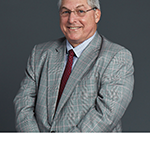Distinguished Basic Investigator Award
 Bruce Cronstein, MD, MACR, Paul R. Esserman Professor of Medicine and director of the Clinical and Translational Science Institute and Division of Translational Medicine at the New York University School of Medicine, received the Distinguished Basic Investigator Award for making outstanding contributions to rheumatology.
Bruce Cronstein, MD, MACR, Paul R. Esserman Professor of Medicine and director of the Clinical and Translational Science Institute and Division of Translational Medicine at the New York University School of Medicine, received the Distinguished Basic Investigator Award for making outstanding contributions to rheumatology.
Dr. Cronstein obtained his medical degree from the University of Cincinnati College of Medicine in 1976. Four years later, he completed his residency in internal medicine at the University of Cincinnati and Lenox Hill Hospital, New York. By 1983, he had completed his rheumatology fellowship at the New York University School of Medicine in the Division of Rheumatology. In 2006, he founded the school’s Master of Science in Clinical Investigation program and three years later, its Clinical and Translational Science Institute.
For nearly 40 years, Dr. Cronstein has been immersed in laboratory investigation and experimental work. His first discovery: Adenosine, a molecule generated by adenosine triphosphate metabolism, which inhibits inflammation. He subsequently learned the anti-inflammatory effects of methotrexate are primarily mediated by an increase in adenosine released from cells at inflamed sites and that adenosine is also involved in the pathologic mechanism leading to fatty liver and liver fibrosis. In the mid-1990s, his lab demonstrated that adenosine plays an important part in wound healing and in the subsequent fibrosis and scarring that occurs in extensive wounds.
Dr. Cronstein and his colleagues have also made important observations on the anti-inflammatory mechanism of action of such drugs as aspirin, corticosteroids, colchicine and sulfasalazine. They discovered that adenosine is critical to maintain bone homeostasis, can be used to promote bone regeneration and maintains chondrocyte homeostasis. Dr. Cronstein is now developing a novel adenosine-based therapy for treatment and reversal of osteoarthritis.
In 2018, he co-founded Regenosine, a startup that uses his intellectual property to create medicines for osteoarthritis. He chairs the company’s scientific advisory board.
Dr. Cronstein joined the ACR in 1980 and considers the organization his professional home. Over the years, he has played important roles in the association. He was a member of the Committee on Ethics and Conflict of Interest, chaired the Committee on Research for two terms and served as an ACR board member between 2014 and 2017. He was also named an ACR Master in 2016.
Dr. Cronstein received the 2013 Lee C. Howley Sr. Prize for Research from the Arthritis Foundation.
“Although my research sometimes branched out into other areas, it hasn’t strayed too far from my original interests in arthritis and rheumatology,” Dr. Cronstein says. “Being recognized by the ACR for my work is really the capstone on my career.”



